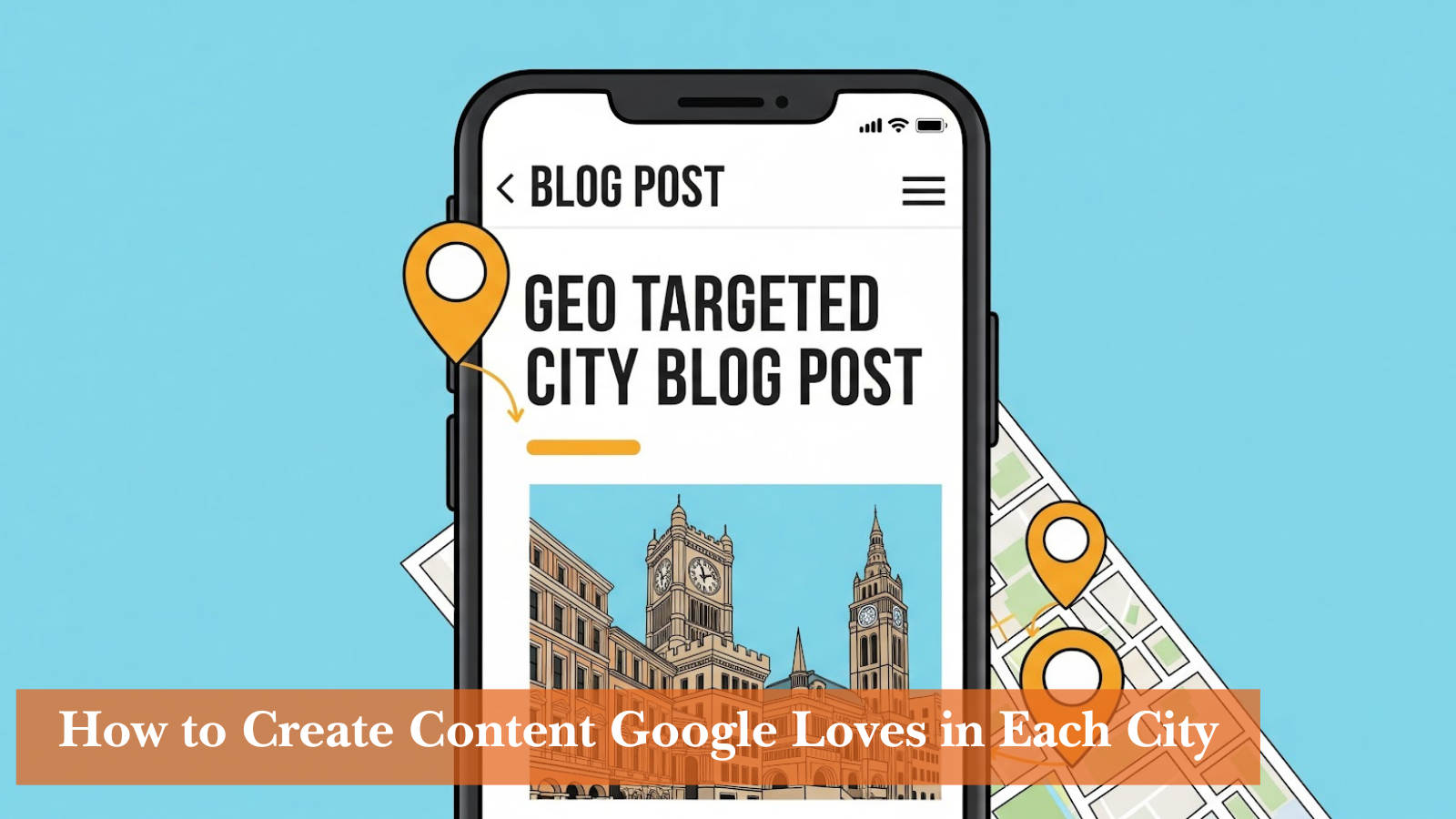If you’ve been struggling to get eyes on your content in specific cities, you’re not alone. Even the most helpful blogs can get buried in search results when they aren’t tailored to a location, and that’s where geo-targeting comes in.
Google still rewards content that signals relevance to a specific city or region. When someone searches for services in their area, location-based content helps ensure your business appears on their radar.
Pairing blog content with local SEO services remains one of the most effective ways to boost visibility in competitive markets. If your content doesn’t mention local context, you risk getting lost among generic posts with broader reach but less impact.
What Is a Geo-Targeted Blog Post?
A geo-targeted blog post is a piece of content written specifically to rank for keywords tied to a particular city, town, or region. It’s the opposite of generic blog content; its value lies in how well it reflects the local audience’s needs, interests, or search intent.
These blogs often tie into a local event, service area, or challenge, like “Best Drought-Resistant Plants for San Diego Yards.” When search engines see relevant city mentions, they’re more likely to surface your blog for local searches.
That means you’re more likely to show up when someone Googles a question or service with their city in the search. In short, geo-targeted blog posts help your content get discovered by the right people, in the right place, at the right time.
Also Read: Understanding Local Search Intent: How to Read Your Customers’ Minds
How to Build a Geo-Targeted Blog That Google Will Rank
Knowing what a geo-targeted blog is isn’t enough; execution is what counts. A seasoned SEO company will focus on three key areas to help a business rank locally: strategic keyword placement, authentic local context, and trust-building through intelligent internal and external linking. This section breaks down each part, allowing you to apply it confidently.
1. Use Location Keywords in the Right Places
The way you use your city’s name can make or break your blog’s visibility. These tips ensure your content sounds natural while still being optimized for local SEO.
- Add your city name to the title, intro, and one subheading: This placement signals local intent to Google immediately. It also tells readers your content is designed for their area. For example, “Best Outdoor Dining Spots in Santa Monica” is more searchable and clearer than a vague title. However, ensure the city name fits naturally within the sentence.
- Mention local neighborhoods or landmarks for variety: Using terms like “Mission District” or “near Wrigley Field” helps avoid keyword repetition. These details also feel more conversational and locally accurate. Google recognizes these as related location signals, which can boost relevance. Readers will also appreciate the specificity.
- Avoid overusing the main city keyword: Stuffing “Houston HVAC repair” into every paragraph makes your blog unreadable and suspicious to search engines. Instead, focus on using it once where it counts, then diversify your language. Keywords are most effective when used sparingly and in context. Too many can harm your rankings.
- Write as if you’re talking to a resident, not an algorithm: Think about what someone in that city would find helpful or familiar. Use their language and reference points. If your blog doesn’t sound like something you’d read out loud, it probably needs editing. Google is improving at identifying natural, helpful content.
2. Add Local Context That Makes Your Content Unique
Simply dropping a city name won’t suffice; your content needs to sound as if it came from someone who knows the area. Just like a digital marketing agency will focus on weaving in real-world details that make your blog feel grounded and authentic, helping it stand out in local search results.
Maximize Your Online Impact with The Ad Firm
- Local SEO: Capture the local market with strategic SEO techniques that drive foot traffic and online sales.
- Digital PR: Boost your brand’s image with strategic digital PR that connects and resonates with your audience.
- PPC: Implement targeted PPC campaigns that effectively convert interest into action.
- Reference real problems or scenarios that happen in the city: Mention things like “flooded intersections during Austin’s spring storms” or “parking limits in downtown Denver.” These paint a clearer picture for both readers and search engines. Localized content performs better because it’s more useful.
- Include well-known spots or institutions in your examples: Talk about places locals visit, like city parks, farmers markets, or school zones. Phrases like “right next to Lincoln Square” or “across from Pike Place Market” show familiarity. Authenticity builds trust and enhances engagement.
- Highlight city-specific rules, trends, or pain points: If you serve homeowners, mention permits or zoning that differ in that city. For businesses, talk about tourist seasons, tax differences, or weather impacts. These nuances prove your content is tailored, not copied from a national template.
- Use real insights instead of vague claims: Saying “we understand the area” doesn’t mean much. But describing how “high humidity in Miami affects roof maintenance” proves you do. Google rewards these signals of expertise, and readers feel more confident in what you offer.
3. Link to Local Pages and Authority Sources
After you’ve written localized content, you need to connect it to other trusted sources. This helps Google understand your blog’s place within the local ecosystem and guides readers to take action.
- Link to your own city service page or contact page: If you mention a service, direct users to your local landing page for it. This reinforces relevance and improves your site’s internal linking structure. It also enhances the page’s ecommerce SEO power by indicating which service page aligns with the blog’s focus. For example, link “book a Dallas roof inspection” to your Dallas roofing page.
- Cite trusted external sources like city websites or local news: These show your content is backed by accurate, location-specific information. A blog about outdoor permits might link to the city’s recreation department. These outbound links help build credibility and improve ranking. Google sees that you’re referencing legitimate information.
- Add location-enhancing tools like embedded maps or local directories: Including a Google Map or linking to a local business directory can make your blog more helpful. These elements also increase dwell time, which in turn enhances search performance. Plus, they help visitors plan a visit or take the next step.
- Don’t link just for the sake of it, keep it local and relevant: A blog for San Diego readers shouldn’t link to general state or national sources unless necessary. Every link should support the blog’s local theme. Irrelevant links can confuse readers and dilute the focus of your content.
How to Choose the Right Local Topics for Each City
Streamline Your Digital Assets with The Ad Firm
- Web Development: Build and manage high-performing digital platforms that enhance your business operations.
- SEO: Leverage advanced SEO strategies to significantly improve your search engine rankings.
- PPC: Craft and execute PPC campaigns that ensure high engagement and superior ROI.
Picking the right topic is the first step to making your geo-targeted blog rank. Here’s how to find ideas that people in each city are already searching for:
- Use real user data to guide your topics: Google Autocomplete, “People Also Ask,” and city-specific forums reveal what people are actively searching for. Typing a service, such as “pest control Austin,” can surface frequent questions or concerns. These platforms show you phrasing and topics that matter to locals right now. You’re not guessing, you’re using signals from real search behavior.
- Look for events, seasonal issues, and local comparisons: Citywide events, climate-specific issues, and “versus” content (like “Solar vs. Grid Energy in Scottsdale”) are all great options. These topics tap into real-time interest and show that your business understands local needs. You’re not just targeting a place, you’re speaking to what people care about in that place. That makes your blog more clickable and more useful.
- Avoid broad topics that aren’t tied to local context: Generic blogs like “Why Roof Inspections Matter” won’t stand out unless they speak to something regional, like hurricane prep in Tampa or wildfire risk in San Diego. Readers and search engines both want to see content that’s tailored. If a post could apply to any city without changing a word, it probably won’t perform well. Add location-specific value or skip the idea entirely.
Common Mistakes That Hurt Local Blog Performance
Even with good topics and writing, a few common missteps can drag down your blog’s results. These are the mistakes to avoid if you want your local content to rank and stay visible:
- Overusing the city name throughout the content: Keyword stuffing, such as repeating “Dallas electrician” in every sentence, can make your writing awkward and lower its quality. Google may flag the page as spammy, which hurts rankings instead of helping. You only need a few well-placed mentions to establish local relevance. Write naturally, and let the city references flow where they make sense.
- Copy-pasting the same blog across cities with swapped names: Search engines recognize when the only difference between two pages is the city name, and they often filter these out as duplicate content. This tactic saves time but doesn’t provide real value to local readers. Each city’s blog should speak to its unique context, challenges, or customers. Repetition signals laziness, not relevance.
- Leaving outdated references or broken local ties: A blog that mentions events from 2022 or links to now-closed businesses sends the wrong signal to readers and search engines. It shows that your site might not be actively maintained. Stale content is less likely to rank well or get shared. Regular updates keep your local blog trustworthy and aligned with current trends.
Let The Ad Firm Help You Build a City-by-City Content Strategy
Writing geo-targeted blog posts that rank isn’t just about adding city names; it’s about building a scalable strategy that earns local traffic. At The Ad Firm, we specialize in creating localized content that connects with real searchers in every market you serve.
Advance Your Digital Reach with The Ad Firm
- Local SEO: Dominate your local market and attract more customers with targeted local SEO strategies.
- PPC: Use precise PPC management to draw high-quality traffic and boost your leads effectively.
- Content Marketing: Create and distribute valuable, relevant content that captivates your audience and builds authority.
Our team combines on-the-ground research, smart keyword mapping, and conversion-focused writing to help your business show up in the right places. We don’t rely on templates or shortcuts; every post is carefully crafted to reflect your brand, services, and target locations.
From optimizing your local SEO services to structuring entire content campaigns that span multiple cities, we know how to build digital footprints that grow with your business. Ready to expand into more markets without losing your voice?
Contact The Ad Firm for a free consultation, and let’s map out your next city-by-city SEO strategy.






